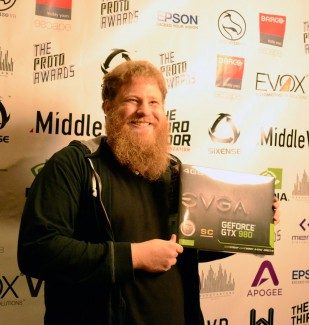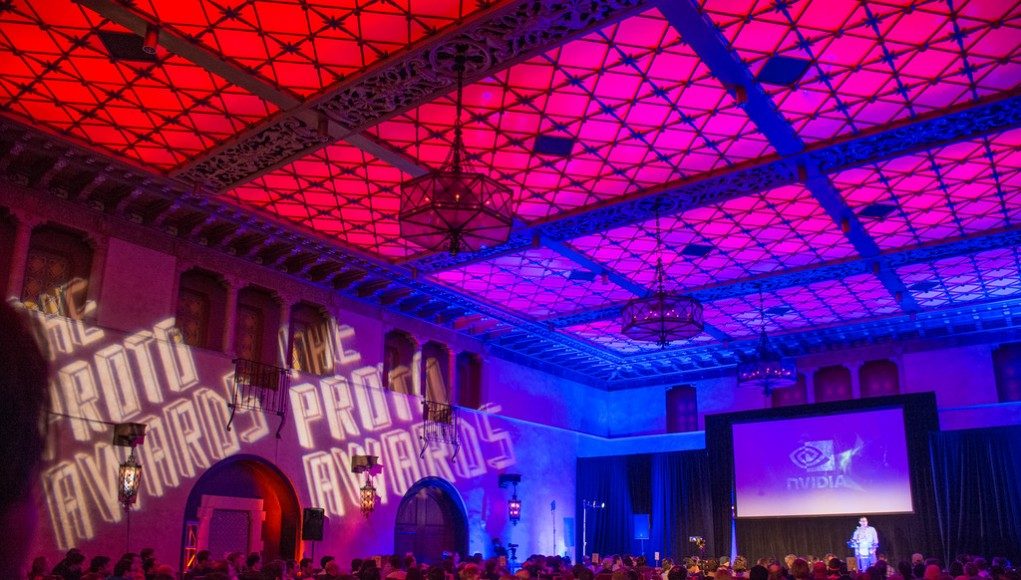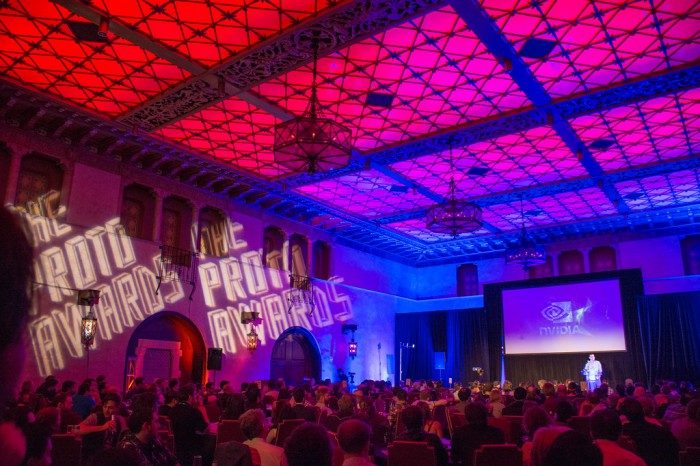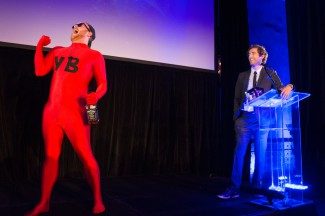At the first ever Proto Awards last week, Zombies on the Holodeck, developed by Survios, took home three awards including Best Overall. The event was a resounding success, honoring innovative work happening in the young VR industry. Nvidia, one of the sponsor of the event, sent winners home with brand new GeForce GTX 980 graphics cards.
See Also: Killing Zombies with the Survios Prime 3 Prototype is a Blast
In the Blossom Ballroom at the Hollywood Roosevelt hotel, the site of the first Academy Awards, Protos Founder Jonnie Ross took to the podium in front of a full house of VR developers and enthusiasts.
“Is it too early for a VR awards show?” Ross asked. “Yes,” he answered promptly, before his question had time for proper consideration, with laughs from the audience. His speech continued, noting that while the people who would come on stage to accept an award were certainly deserving, their achievements were only made possible by those who laid the groundwork upon which their VR games and software stand. A round of applause was given in recognition to those unsung heros.

Winners received awards across 11 categories:
- Best GUI: Tiltbrush
- Best Art direction: Synthesis Universe
- Best live action: Strangers with Patrick Watson
- Best Interaction Design: (tie) Sixense Lightsaber demo & Zombies on the Holodeck
- Best Gameplay: Darknet
- Best social experience: Riftmax
- Best score: Senza Peso
- Best sound design: (tie) The Gallery: Six Elements & Dreadhalls
- Most Transportive: Zombies on the Holodeck
- Most innovative: Diplopia
- Best Overall Experience: Zombies on the Holodeck
Though it sounds cliche, as a member of the Board of Governors who chose the winners, it really was tough to pick. Award or not, all of the nominees impressed in some way, even the most bizarre nominee, VR Butts.
Winners took home the brand new GeForce GTX 980 from sponsor Nvidia and attendees each received a Google Cardboard kit from DodoCase.
See Also: Nvidia’s New Graphics Cards Are Designed for High Performance Virtual Reality Rendering
 Thomas Middleditch from HBO’s Silicon Valley did a fine job hosting the event, his script mostly poking fun at the fledgling VR industry, with plenty of laughs from the audience.
Thomas Middleditch from HBO’s Silicon Valley did a fine job hosting the event, his script mostly poking fun at the fledgling VR industry, with plenty of laughs from the audience.
One of the more hilarious moments of the night was when Middleditch pitched the audience an idea for a VR game: a simulator of Middleditch’s bathroom where users would sit on the toilet and have to console his small but bossy dog. What seemed like a joke at first became all too real; for reference material he actually pulled up a video, taken while on his toilet, of his dog coming into the bathroom and growling until being pet.
And while the bizarre dog pitch got plenty of laughs, the funniest moment of the night may have been when a drunk personified Virtual Boy crashed the show.
“We killed VR in ’95!” got lots of laughs from the audience thanks to the double entendre of Virtual Boy’s mistaken notion of success with the audience’s knowledge of Virtual Boy’s near-universal failure as a virtual reality product and the damage it may have done to the industry at that time.
The event ran smoothly save for the actual Proto Award trophy itself which apparently broke prior to the show, leaving only one trophy as backup. Middleditch poked fun at this leading to a subtle running joke throughout the evening.
After the show, just about everyone I talked to said they enjoyed it, with many people saying it was better than they expected. Given the night’s success, there’s a good chance we’ll see another Proto Awards in 2015.









